Community Celebrations: Lunar New Year
Celebrating family and ancestors with food and gifts
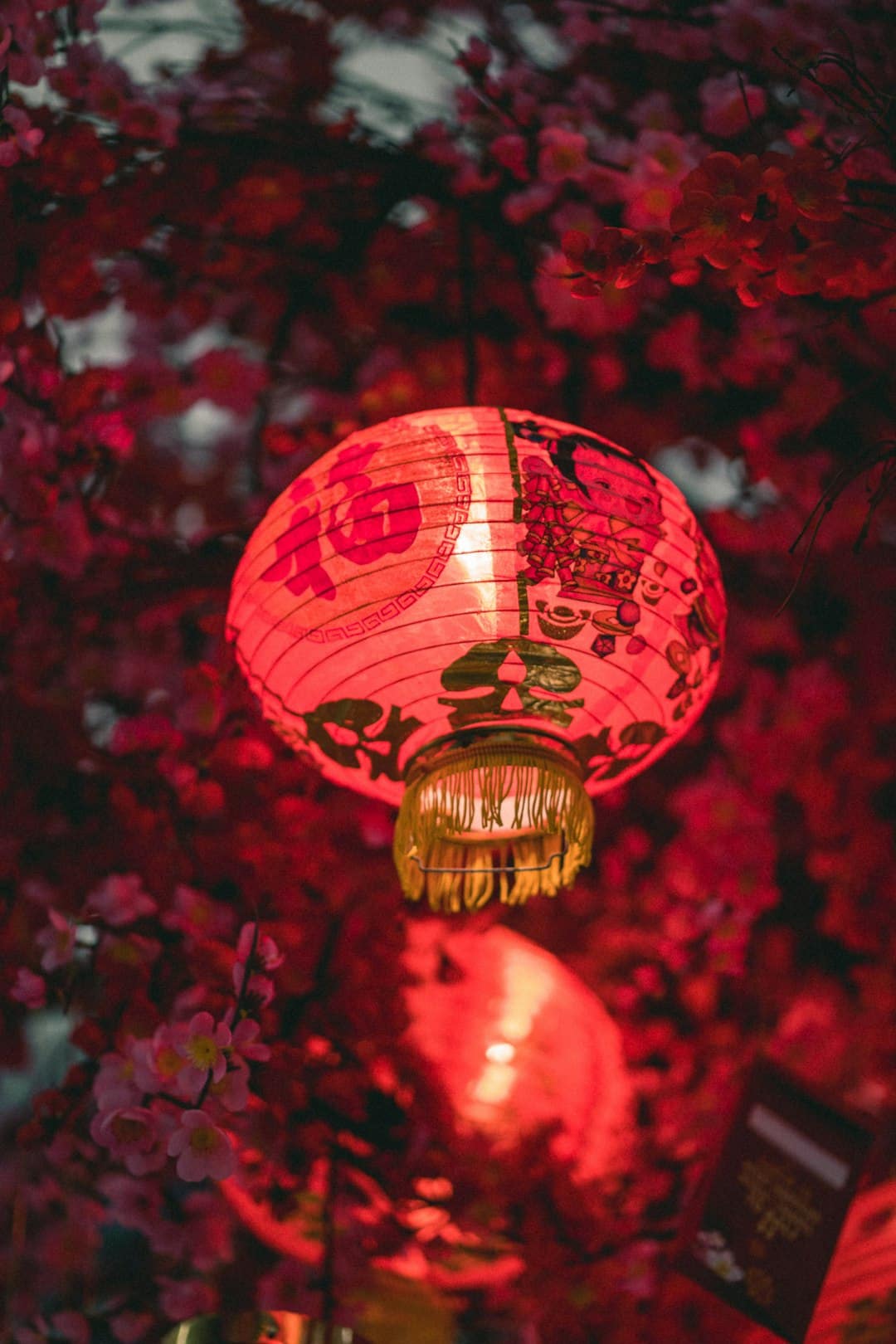
—L-unar New Year marks the beginning of the lunar calendar in many East Asian countries including China, Korea, Thailand, Bhutan, and more—and in East Asian communities here in the United States. Rather than being a single day of celebration, Lunar New Year is a holiday spanning multiple weeks and, in Chinese communities, culminating with a lantern festival.
Different countries and cultures celebrate the Lunar New Year differently, but common themes are food, family, and celebrating and honoring ancestors.
For Chinese New year, people place red paper on the outside of their house to ward off the mythical monster, Nián while they dine together on New Year’s Eve. Children receive small red envelopes from older family members with money inside. The coins traditionally placed inside are said to scare away monsters—or they can be used to bribe the monsters for the children’s safety.
Each lunar year is represented by a different animal from the Chinese Zodiac. The year beginning on February 10, 2024, is known as the year of the Dragon. Dragons are said to be self-aware, energetic, and strong leaders.
Recommended Watching and Reading for Lunar New Year
This list will grow as community members contribute. Send recommendations to hello@burlington.buzz.
This list of books from Penguin Random House looks at the Lunar New Year from all ages and multiple cultures and perspectives, from a counting book to a cookbook and more.
Where to Go In-Person and Online to Learn More About Lunar New Year
- Sign up for a Smithsonian National Museum of Asian Art virtual tour for Lunar New year.
- Go to the Lunar New Year flower market at Chinatown between now and Friday, February 9.
- Go to the Lunar New Year Cultural Village at Chinatown on February 18 in conjunction with the Chinese New Year parade.
Activities for Adults and Children to Learn More About Lunar New Year
As always, WBUR has a great list of activities to learn about and celebrate the Lunar New Year, ranging from performances to dining to hands-on activities.
There is also a Chinese Zodiac scavenger hunt at the Harvard Museum of Natural History in Cambridge, running from now through the end of the month.
Local Lunar New Year Happenings
Below are just a few events happening somewhat locally to celebrate Lunar New Year in 2025. Let us know if you have one you’d like to add!
- January 27th to February 2nd - Lunar New Year specials at Karma Asian Fusion Cuisine featuring "The Year of the Snake" cocktail along wtih two specialty hand rolls only available during the week of Lunar New Year. (Burlington)
- January 30 - Lunar New Year Night Market at Bow Market with drink and food specials plus performances. (Summerville)
- February 8 - 𝟐𝟎𝟐𝟓 𝐁𝐂𝐀𝐀 𝐂𝐡𝐢𝐧𝐞𝐬𝐞 𝐍𝐞𝐰 𝐘𝐞𝐚𝐫 𝐆𝐚𝐥𝐚 featuring music, dances, and other performances by residents in the Chinese-American community. (𝐂𝐡𝐞𝐧𝐞𝐫𝐲 𝐀𝐮𝐝𝐢𝐭𝐨𝐫𝐢𝐮𝐦)
- February 9 at 10 AM - Lion Dance Parade at Chinese New Year Cultural Village and enjoy lion dances, live performances, Chinese calligraphy, and more.
- February 9 at 10 AM - Chinese New Year Parade and Festivities in Boston (Beech Street Center, Belmont; free admission, all are welcome)
- February 15 at 10 AM - Lunar New Year Festival at Peabody Essex Museum: Enjoy folktales and live music to celebrate the holiday. (Salem)
Reader Stories
From Jessika DuBay-Dang
Each Asian country that celebrates Lunar New Year has its own traditions. For the Vietnamese people, the New Year celebration is called Tết. Festivities are usually 3 to 7 days. For our family we don't do all of the traditions, but we do a few days of celebrations. My in-laws set up two ancestral altars, one for the spirits of their ancestors and another for the heavens and the earth. This ceremonial tradition carries the significance of leaving behind the misfortunes of the past year to welcome the forthcoming year's blessings and goodness. You have to clean your house so as to leave behind any remnants of the past year’s misfortunes and to bring in a prosperous New Year. Tết is largely about family and celebrating elders. Children are given lucky red envelopes with money from family members.
We decorate with yellow, pink, white and orange flowers (like apricot blossom and peach blossom) and fruit trays of five fruits (try to get fruits of varying colors based on what's available where you live). You also decorate with "cakes" made of glutinous rice, mung beans and pork wrapped in banana leaves. They are called Bánh chưng. We will have a big family gathering and wear our traditional Ao Dai's. There will be a huge feast and a ceremony to honor the elders and ancestors.
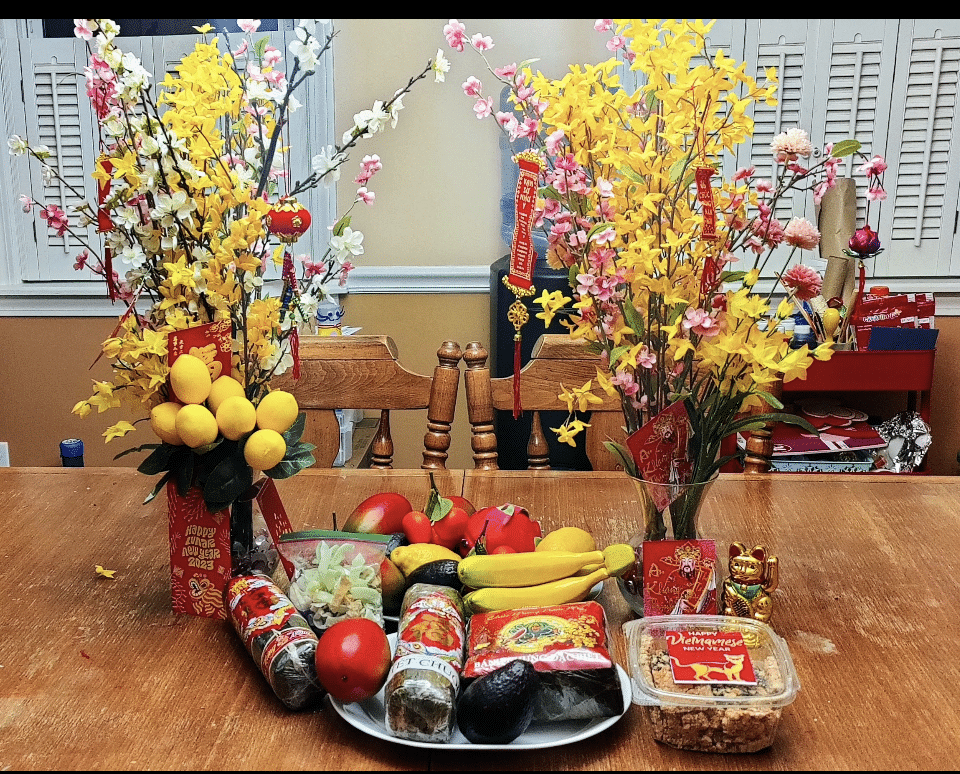
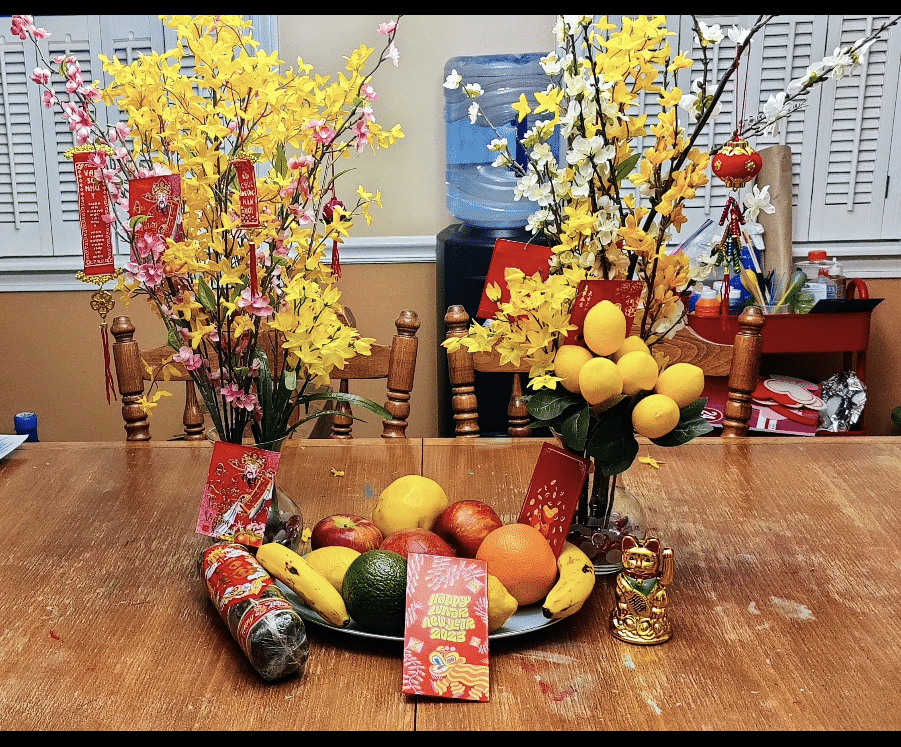
The Dang family celebrates Tết with two separate altars--one for the spirits of the ancestors, and one for the heavens and earth.
From Jessica Lin
My family is ethnically Chinese from Vietnam so we celebrate a mixture of both cultures. In Vietnam the Lunar New Year is called Tết. In Vietnamese and Chinese culture, symbolism is very important, so a lot of the traditions surrounding Tết are meant to symbolize auspicious things for your life in the coming year.
A common theme are flowers. Yellow chrysanthemums represent good luck and longevity. Orchids are considered refined, representing luxury and abundance. Flowering branches of yellow apricot blossoms are common in Southern Vietnamese households, the yellow color symbolizing hope for a prosperous new year.
For food my family likes to make bánh chưng, which is a square shaped glutinous rice cake filled with pork and mung beans, wrapped in banana leaves and slowly boiled until cooked. The color and appearance is meant to represent the earth. This is given out as gifts and eaten for New Year. Citrus is also a big component of New Year.
On New Year's Eve we have a big dinner with family with lots of dishes that have a lot of symbolism as well, such as noodles representing long life, and whole fish where the Chinese word is a homophone for the word for "surplus." And married couples distribute red envelopes full of money to children and unmarried members of their family. Then the next day we visit a Buddhist temple to pray for a good year and get our fortunes read.
Like with any holiday, it's always a nice excuse to spend time with loved ones and hope for good things to come.
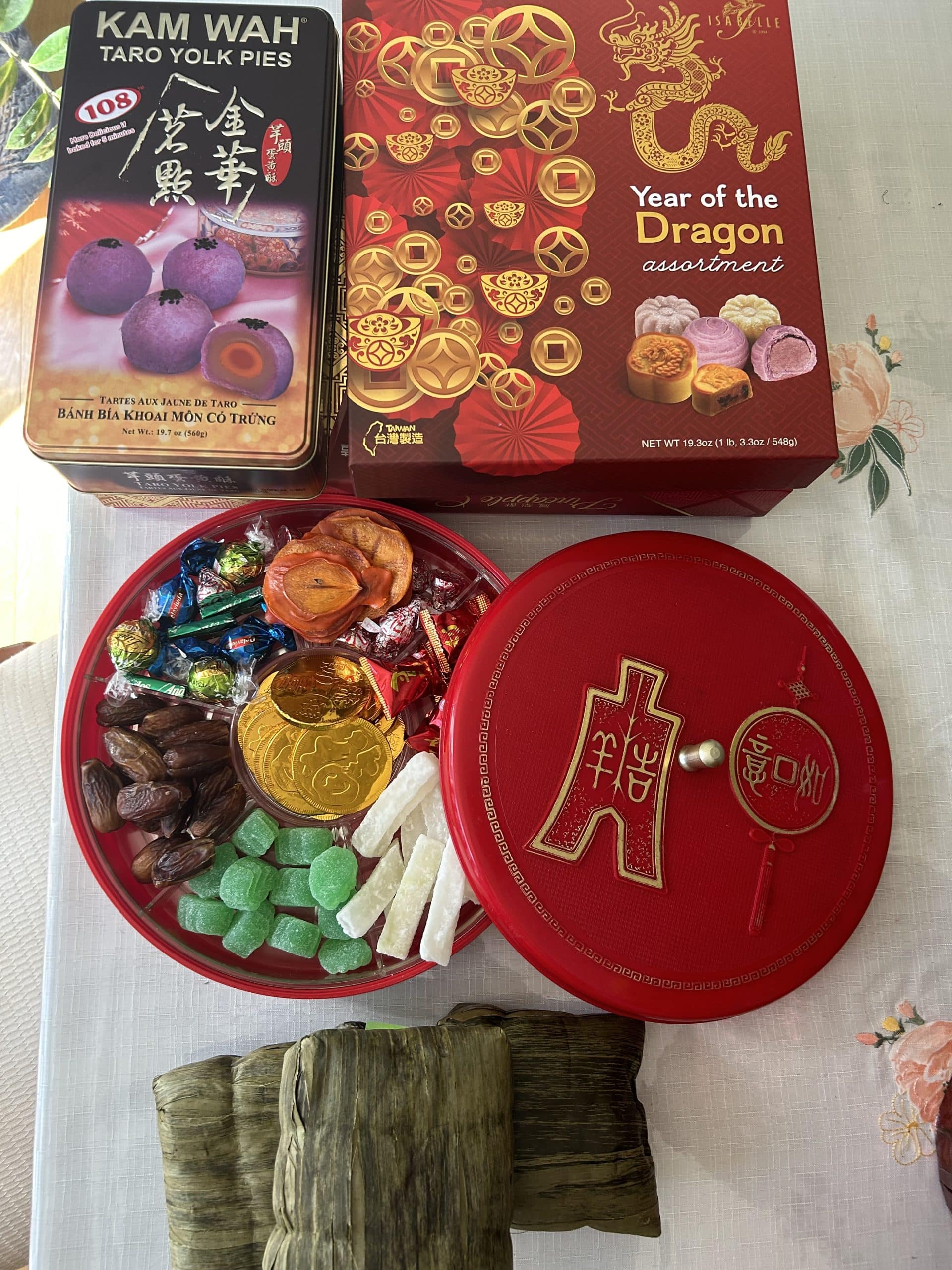
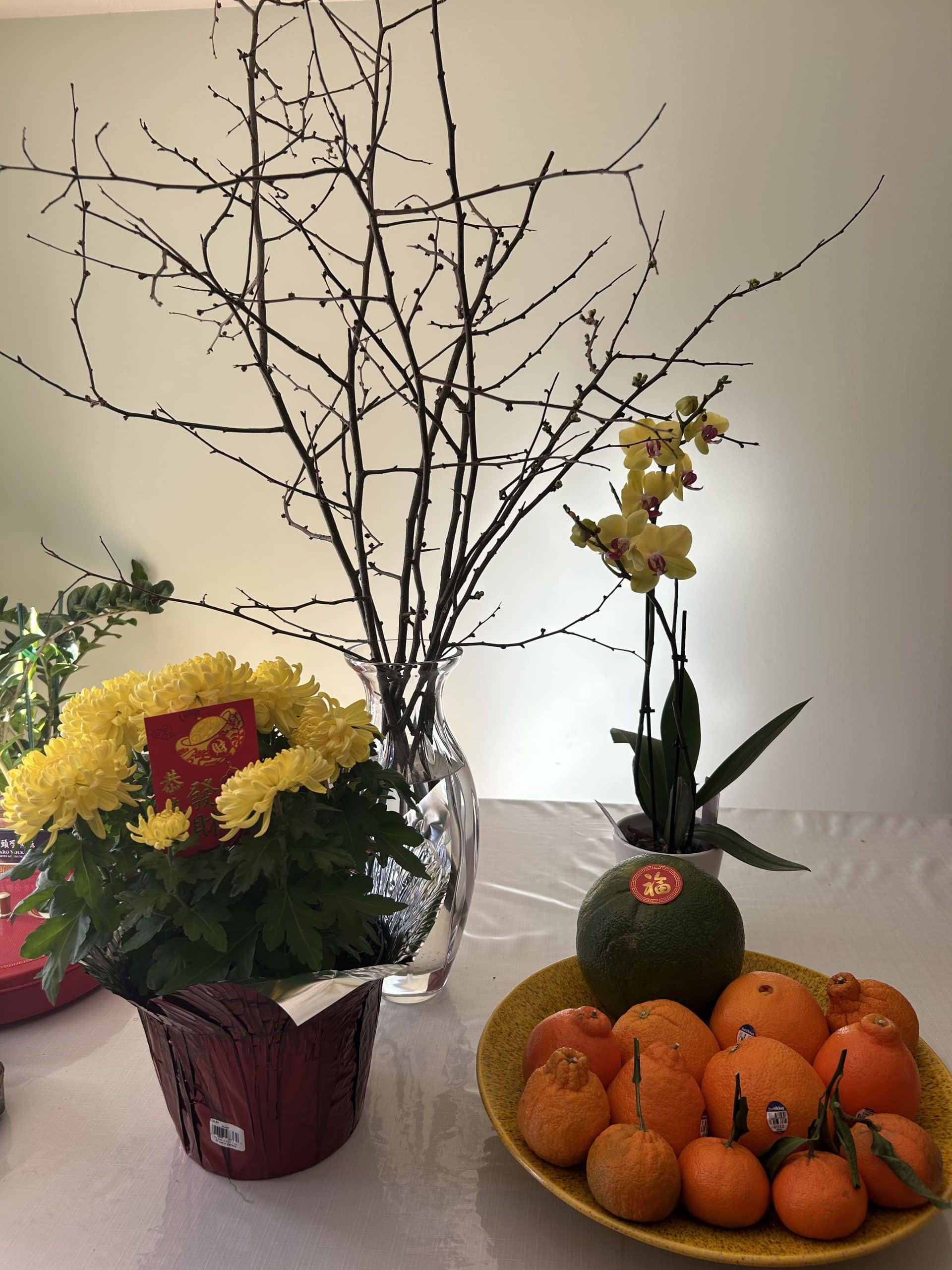
Some foods are decorations that are a part of the Lunar New Year celebration for Jessica's family.
From Zi Wang
Growing up in northern China, one of the longest, most important and special holidays was always the Lunar New Year. In Mandarin it is called Chun Jie, which means Spring Festival in English. The holiday marks the end of winter, the return of spring and hopes for the new year. According to legend, it has been around for more than 4000 years. It became an official festival around 2000 BC when Emperor Shun led his government officials to offer food to their ancestors at the end of an old year and the start of a new year.
There are many legends about why we like fireworks and the color red during the Spring festival. One legend is that a couple thousand years ago there was a fierce monster named Nian (which means “year” in Chinese) whose head looked like a lion with large horns and giant teeth. It kept attacking villagers at the end of winter/beginning of the spring because there was no food, and it was very hungry. Luckily one year the village people found out the monster Nian was afraid of loud noises, bright lights, and the color red. The people in the village finally chased Nian away with fireworks and decorated the whole village in the color red.
In my family’s tradition we celebrate the Lunar New Year for 15 days. Beginning with Lunar New Year’s eve, family members get together to enjoy a big meal. I asked some Chinese families around Burlington how they celebrate Lunar New Year. Northern Chinese love to have fish as an essential dish, which symbolizes “bounty/prosperity.” Cantonese families love to have lettuce and pork elbow, which means “wealth,” and also love to have fish, chicken and a special type of shrimp meaning “happiness.” People from Hubei Province love to have 8 cold dishes and 8 hot dishes of food on the table for everyone to enjoy. After the big meal, families like to watch special TV programs or play card games or other games like “ma jiang” as they stay up until midnight. At midnight, traditionally we would all start our fireworks, however that might scare more than mythical creatures, so instead we happily wish each other “Happy New Year!”
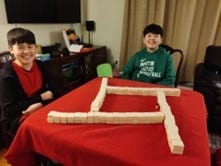
- Day 1, Children say New Year greetings to their parents/grandparents, and get red envelopes with brand new bills in them.
- Day 2-Day3, Relatives/friends visit each other, kids get more red envelopes.
- Day 4, Prepare more food, tomorrow will be the deity of wealth’s birthday.
- Day 5, It’s called “break 5”, eat food from yesterday, no need to work or cook.
- Day 6, it’s an auspicious day to begin new plans and business.
- Day 7, the people’s day, more food.
- Day 8, if it’s a nice day, it means the farmers will have a good year.
- Day 9, spiritual introspection and praying for peace in the new year.
- Day 10, praying to the Earth, no knife sharpening, no disturbing the ground
- Day 11, in-law parents would invite their son-in-law for a nice meal.
- Day 12, hanging new lanterns.
- Day 13, preparing for the 15th day.
- Day 14, dragon and lion dance, many markets full of games and food for people to enjoy.
- Day 15, the last day of celebration, people eat “tang yuan” (glutinous rice balls with filling) to bless having a happy family for the whole year.
In Burlington there are many Chinese who are celebrating our traditional holiday as much as we can. Families and friends visit each other, cook together, decorate our homes for the holiday, go to different towns for different shows, etc. Lunar New Year traditions vary across regions and families, but all have themes of family and togetherness. Here are some Burlington residents’ decorations.
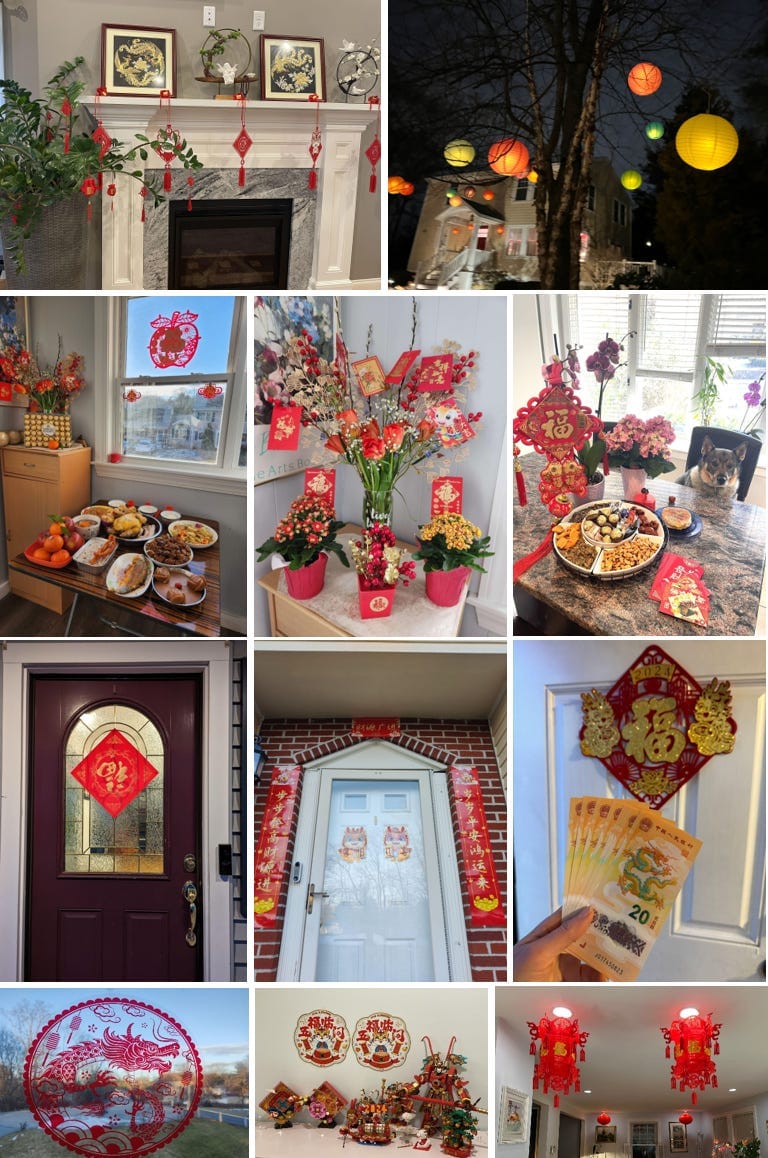
How do you celebrate Lunar New Year/Chinese New Year? What resources would help your neighbors and their children and grandchildren learn more about this exciting holiday? Share your stories with us by emailing hello@burlington.buzz, and your story could be added to this feature!
What are you celebrating or observing? Let us know at hello@burlington.buzz!




